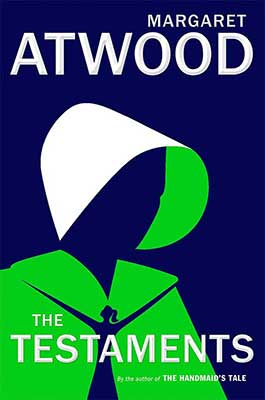The Testaments

by Margaret Atwood
8/10
I write these words in my private sanctum with the library of Ardua Hall – one of the few libraries remaining after the enthusiastic book-burnings that have been going on across our land. The corrupt and blood-smeared fingerprints of the past must be wiped away to create a clean space for the morally pure generation that is surely about to arrive. Such is the theory.
The reason I only gave this book 8/10 was because it is not a stand-alone novel. I suppose you could read it on its own, however, a reader who is not familiar with the world of The Handmaid’s Tale might find it confusing and befuddling. Otherwise, The Testaments is a definite 10/10.
On that note, I highly recommend reading The Handmaid’s Tale, the precursor to this edition. If you have already read the first book, or if you are familiar with the critically-acclaimed television adaptation, The Testaments will stand up to your expectations.
The story is told through a series of testimonies which are examined by a panel of experts at a conference set in the not-so-distant future. Whether written, recorded, or handed down as a sort of folk tale, we will never really know, although there is speculation on this in the final chapter of the book. The testimonies come from three women directly involved and affected by the world of Gilead. The first is Aunt Lydia who writes a secret diary that she has hidden away. In this diary she shares her thoughts, observations, schemes, and regrets from the conception of Gilead, through its rise and ultimate failure.
The second woman is Agnes, the daughter of a Commander, soon to be wed to another commander at a very young age. She manages to escape her fate thanks to the help of Aunt Lydia who may or may not have nefarious motives for her actions.
Lastly, we hear the testimony of a young Canadian girl turned Gilead spy who has a startling connection to both Aunt Lydia and Agnes.
As each shares their part in the events that unfold, we become witness to three different perspectives of life both within and from beyond Gilead. We learn how political objectives, although well-meaning, can become twisted with the acquisition of power, devolving into a decaying and corrupt system that objectifies and enslaves women. Each of the women involved manages to escape whether to salvation or through tragedy.
Margaret Atwood’s work defines her as one of the world’s most influential novelists and literary critics of modern times. Beyond mere entertainment for the reader, her writing teaches and warns of us the fallacies that may easily befall our lives if we continue to ignore the disintegration of moral society.
